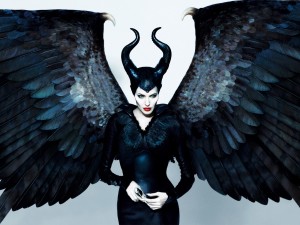
Was Maleficent a victim of rape because her wings were clipped by a man? Or are some people just lunatics?
Like many dangers in this deeply depressing world, sexual assault is real and it seems in many cases to be omnipresent, especially for Maleficent.
According to studies, one in five college-aged women are victims of some form of sexual assault, up to and including rape. Chances are, someone you know, whether it be a friend or a co-worker, was raped or assaulted at some point in their lives.
Because more victims (or survivors) are speaking out about their experiences with sexual assault (as well they should), there seems to be an even greater sensitivity about the subject, lending itself to the belief in an all-encompassing, pervasive rape culture, where it’s believed that rape and sexual violence are indelibly linked to society in a way that not only victimizes and subjugates women (Yes, All Women), but pretty much positions every male as a potential rapist.
The problem with rape culture, from a definitive standpoint, lies in its analogous definition. By that, I mean there’s no true, definitive description of what exactly is a rape culture, per se, nor what qualifies in terms of factors to determine if a society meets the criteria that’s murky at best.
The thing is, rape culture cannot be distinctly defined, because it so closely intertwines with so many outlying social factors such as race, age, socioeconomic status, etc. For some, rape culture is endemic of victim-blaming, slut-shaming and overall sexual objectification. While each of those issues on their own are troubling, to place them all into one bubbling cauldron of definition, some can use it as a catalyst to raise the issue in places were they simply don’t belong.
Case in point: an article which appeared in the Huffington Post on Monday by writer Hayley Krischer entitled, “The Maleficent Rape Scene That We Need to Talk About“. The article attempts to depict a scene in the Disney film Maleficent where the title character, played by Angelina Jolie, is drugged by a former lover, at which point he cuts off her wings. The author makes the bold and wholly unnecessary assertion that what is actually happening here is akin to rape.
She’s a fairy before the black magic begins. She soars through the forest with freedom and passion. She falls in love with Stefan, a human. He returns to kill her so that he can be king.
But he doesn’t kill her. He rapes her of her ability to fly. He drugs her and leaves her so that he can bring her wings back to the king of the humans like Dorothy was told to fetch the broom of the Wicked Witch. She wakes up moaning, wailing. Stumbling. Utter devastation.
While Maleficent did suffer a betrayal, to liken it to rape is not only ludicrous, it chips away at why we should be upset at the concept of rape. To refer to a situation that is not actually rape serves to dilute the impact and meaning of the word itself.
Which is something men have been told for some time.
A classic example of this word dilution came when George Lucas decided first to update his existing Star Wars trilogy with new effects and added scenes; in one controversial case, Lucas changed one scene to depict the roguish anti-hero Han Solo as not shooting another character in cold blood. This change spurred a line that was viewed by many as troubling:
“George Lucas Raped My Childhood.”
While using rape as an adjective wasn’t at all uncommon (feeding into the concept of a rape culture), the fact that it was used to describe one’s feelings towards a movie was all the more ridiculous. As such, if usage of the word in such a way was shunned then, why wouldn’t it be shunned now, because it came from a woman?
Krischer’s article goes on to explain in depth how it is that what happened to Maleficent so symbolizes rape, which in her mind, is the only important takeaway. She even concedes that the writer of Maleficent, Linda Woolverton, doesn’t consider the scene to depict or even mirror rape, that’s not good enough for Krischer as she tries to take statements from Woolverton and weave them to fit her own narrative:
The wings give her the freedom to escape. To fly away. It’s about her ability to retreat. And if you can’t fly. If you can’t run. If you’re drugged and trapped. Even if you agree to hang out in the forest with your attacker in the first place.
This is the horrific side of rape culture. We’re so enmeshed in it that it’s impossible to ignore that a metaphorical rape occurs in a Disney movie.
Metaphorical rape. To women like Krischer, we are so ensconced in rape culture that we have to point out rape where rape doesn’t even exist. If that’s not disturbing, what is?
Oh, I know…actual rape.
I don’t know that I believe in a rape culture in the way that Hayley Krischer does, and for that, I am grateful. I know that rape is real, I know that women around the world have suffered sexual assault. I personally know women who have been assaulted. I know all these things, and they are both real and disgusting to me. I also know that I will likely never know what it’s like to be raped, to be deprived of something so personal. By default, that will make me, as a man, both ignorant and insensitive to all the views and perspectives of women. That said, it’s my responsibility to do my best to understand and provide an atmosphere, both in person and in my work that is at the very least, not hateful.
I don’t believe in slut-shaming, because I believe that women should have sex with who they want, how they want, when they want. If a woman wants to show off her tits, sign me up in support. I don’t believe that if a woman wants to show her tits that she is required to screw every man that wants her. One of the things we do at the Never Daunted Radio Network is provide that perspective on sex and everything that goes with it that makes the whole enterprise worth talking about, because it should be.
But what I will never abide is the idea that somehow sexual objectification leads to rape. I like looking at tits, and I love talking about them, but that does not make me a rapist in any way. If I have interviews with porn stars, where we talk about their careers and what makes them tick, that is not a statement on women as simply objects.
All that said, I do believe that women, just as much as men, have a responsibility to themselves to be smart and protect themselves from situations that can go south. Be mindful of what you say and what you do. That doesn’t mean hinder yourself or your method of expression, it means exactly what it means. We live in a society not of rape, but of people who will take advantage of any situation they can so long as it benefits them.
That’s a sad reality. But it’s as much a reality as it is that we can’t all leave our doors unlocked or valuables in our car unattended.
Do women in society face more dangers than men? Without question. Does that situation solve itself by fomenting a culture of fear and paranoia through accusations of metaphorical rape?
Not a chance.
Hashim R. Hathaway (Shimbo) is the host of the Never Daunted Radio Network, and proud father to NeverDaunted.Net. You can reach him on Twitter @NeverDauntedNet
